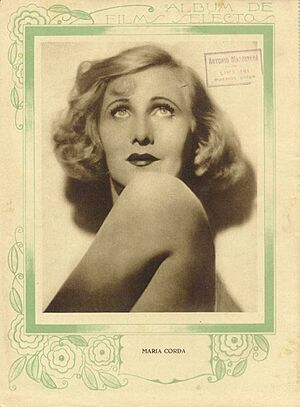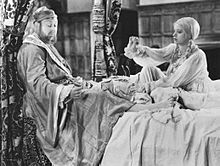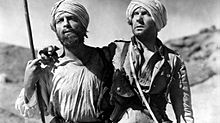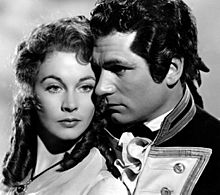Alexander Korda facts for kids
Quick facts for kids
Alexander Korda
|
|
|---|---|
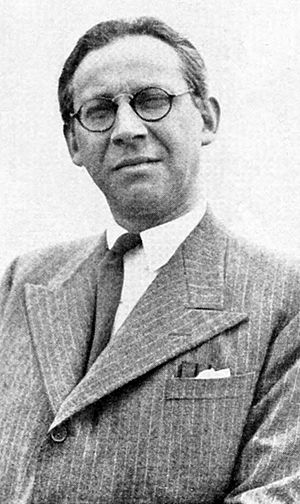
Korda in 1936
|
|
| Born |
Sándor László Kellner
16 September 1893 Pusztatúrpásztó, Austria-Hungary (today part of Túrkeve, Hungary)
|
| Died | 23 January 1956 (aged 62) Kensington, London, England
|
| Occupation |
|
| Years active | 1914–1955 |
| Spouse(s) |
Maria Farkas
(m. 1919; div. 1930)Alexandra Boycun
(m. 1953) |
| Children | 1 |
| Relatives | Zoltan Korda (brother) Vincent Korda (brother) Michael Korda (nephew) Chris Korda (great-niece) |
Sir Alexander Korda (born Sándor László Kellner; 16 September 1893 – 23 January 1956) was a famous film director, producer, and writer. He was born in Hungary but became a British citizen. He started his own film studios and a company that distributed movies.
Korda began his career in Hungary. He also worked for a short time in Austrian and German silent films. From 1926 to 1930, he worked in Hollywood, USA. This move led to his divorce from his first wife, Maria Corda. She found it hard to switch from silent films to "talkies" because of her strong Hungarian accent.
From 1930, Korda became a very important person in the British film industry. He created London Films and later owned British Lion Films. Korda produced many classic British movies. These include The Private Life of Henry VIII, Rembrandt, Things To Come, The Thief of Baghdad, and The Third Man. In 1942, Korda was the first filmmaker to be made a knight by the King.
Contents
Early Life and Family
Alexander Korda was born Sándor László Kellner in a Jewish family. This was in Pusztatúrpásztó, which was part of Austria-Hungary. His parents were Henrik Kellner and Ernesztina Weisz. He had two younger brothers, Zoltan and Vincent. Both of his brothers also worked in the film industry, often with Alexander.
After his father passed away, Korda started writing film reviews to help his family. He also changed his family name to Korda. He chose this name from a Latin phrase meaning "lift up your hearts."
Starting in European Silent Films
Films in Hungary
Korda did not have to join the army in World War I because he was short-sighted. He became a key figure in the Hungarian film industry. He started by publishing film magazines like Pesti Mozi. This led to him being asked to write movie scripts. His first script was for Watchhouse in the Carpathians (1914). He also helped direct this film.
In 1916, Korda started his own film company called Corvin Film. Their first movie, White Nights (1916), was a big hit. Korda made Corvin one of the biggest film companies in Hungary. He produced many films, including The Grandmother (1916) and St. Peter's Umbrella (1917). He thought Harrison and Barrison (1917) was his best film from this time.
After a change in government, Korda was briefly arrested in October 1919. He was soon released and left Hungary for Austria. He never went back to his home country.
Films in Vienna and Berlin
After leaving Hungary, Korda went to Vienna, Austria. He worked for a company called Sascha-Film. He helped make the big historical movie The Prince and the Pauper (1920). This film was a huge success around the world. It gave Korda the idea to make "international films" that everyone would want to see.
Korda later left Sascha-Film because he didn't like how much the owner interfered. He then made an independent film called Samson and Delilah (1922). This movie was very grand with many crowd scenes, but it did not do well.
Korda then moved to Germany. He often had money problems but managed to get funding for films. He made The Unknown Tomorrow (1923) and Everybody's Woman (1924). He also made Tragedy in the House of Habsburg (1924), a historical film. Korda often cast his wife, Maria Corda, as the main actress in his German films. Her popularity helped his movies succeed.
Working in Hollywood and France
In December 1926, Korda and his wife sailed to the United States. Korda had a contract with an American film studio. In Hollywood, they found it hard to get used to the "studio system." Korda's first film there was The Stolen Bride (1927).
Korda then worked on the comedy The Private Life of Helen of Troy (1927). This film was a big success for Korda. His wife played the role of Helen. This movie helped him later in Britain.
After this, Korda was often asked to direct films with female stars and exotic locations. His next few films were not as successful. When sound films, or "talkies," arrived, it ended his wife's acting career. Her strong accent made it difficult for her to get roles in American films. Their marriage ended, and they divorced in 1930.
Korda became frustrated with the Hollywood studio system. He wanted to save money to go back to Europe and make films on a large scale. However, his spending habits and losses from the Wall Street Crash made this difficult. He eventually moved to Fox Film Corporation.
Films in France
Korda then went to France. He made films like The Men Around Lucy (1931) and Rive gauche (1931). He had a success with Marius (1931).
Becoming a Film Giant in Britain
Korda moved to London and made Service for Ladies (1932). He then decided to start his own company.
London Films
In 1932, Korda founded London Films. Their first movie was Wedding Rehearsal (1932). He also produced films like Men of Tomorrow (1932) and That Night in London (1932).
The Private Life of Henry VIII
Korda had a massive hit with The Private Life of Henry VIII (1933), which he directed. This film was nominated for an Academy Award for Best Picture. It made Korda famous around the world and turned Charles Laughton into a star.
After Henry VIII
Korda tried to repeat the success of Henry VIII with The Private Life of Don Juan (1934). He also produced The Scarlet Pimpernel (1934), which was very popular. Other successful films he produced include Sanders of the River (1935) and The Ghost Goes West (1936).
Korda directed Rembrandt (1936) with Charles Laughton. Things to Come (1936) is now seen as a classic film.
Denham Film Studios
Korda bought land in Denham, Buckinghamshire, and built film studios there. Denham Film Studios opened in 1936. It was a very modern and complete studio. It had many sound stages and facilities for making films.
Korda became a British citizen on 28 October 1936. He also worked to protect British film production from competition, especially from the United States. He wanted to create a unique "British school of film-making."
He produced Fire Over England (1937) with Laurence Olivier and Vivien Leigh. He also had a big hit with Elephant Boy (1937), which made Sabu a star. Another success was The Drum (1938).
During World War II, Korda made propaganda films like Q Planes (1939) and The Lion Has Wings (1939). He had another huge adventure film hit with The Four Feathers (1939).
Korda faced financial problems, and his Denham studios merged with Pinewood Studios in 1939.
Time in Hollywood and Return to Britain
The start of World War II meant that The Thief of Bagdad had to be finished in Hollywood. Korda stayed there for a few years. While in the US, he produced and directed That Hamilton Woman (1941) starring Laurence Olivier and Vivien Leigh. He also oversaw Jungle Book (1942), a live-action film based on Rudyard Kipling's stories.
Korda was knighted in 1942 for his help during the war. He was the first film director to receive this honor. He returned to Britain in 1943.
British Lion Films
Through London Films, Korda gained control of British Lion Films. He produced A Man About the House (1947).
In 1948, London Films received a large payment for three films: An Ideal Husband (1947), Anna Karenina (1948), and Mine Own Executioner (1948). While some films like The Winslow Boy (1948) and The Fallen Idol (1948) were hits, others lost money. Korda also faced challenges from a trade dispute between British and American film industries.
In 1948, Korda made a deal with American producer David O. Selznick. This led to the highly successful film The Third Man (1949).
London Films also made many films with smaller budgets. These included The Happiest Days of Your Life (1950) and The Wooden Horse (1950). Cry, the Beloved Country (1951) and The Sound Barrier (1952) were also praised.
Korda's final films included The Man Who Loved Redheads (1955) and A Kid for Two Farthings (1955). His last major films were Laurence Olivier's Richard III (1955) and Smiley (1956).
Personal Life
Korda was married three times. His first marriage was to Hungarian actress María Corda in 1919. They had one son, Peter Vincent Korda, and divorced in 1930. In 1939, he married film star Merle Oberon. They divorced six years later. His last marriage was to Alexandra Boycun in 1953.
Korda passed away from a heart attack in London in 1956, at the age of 62.
Legacy
Michael Korda, Alexander's nephew, wrote a book called Charmed Lives (1979). It was about his father, his two uncles, and their family.
The British Academy of Film and Television Arts gives out the Alexander Korda Award. This award is for the "Outstanding British Film of the Year."
Filmography
The following films were directed by Korda:
- 1914 The Duped Journalist
- 1914 Watchhouse in the Carpathians
- 1915 Lyon Lea
- 1915 The Officer's Swordknot
- 1915 Tutyu and Totyo
- 1916 A Dolovai nábob leánya
- 1916 Cyclamen
- 1916 Miska the Magnate
- 1916 Struggling Hearts
- 1916 Tales of the Typewriter
- 1916 The Grandmother
- 1916 The Laughing Saskia
- 1916 The Man With Two Hearts
- 1916 The One Million Pound Note
- 1916 White Nights
- 1917 Magic
- 1917 St. Peter's Umbrella
- 1917 Harrison és Barrison
- 1917 The Stork Caliph
- 1918 Faun
- 1919 Neither at Home or Abroad
- 1919 Ave Caesar!
- 1919 Man of Gold
- 1918 Mary Ann
- 1919 Number 111
- 1919 White Rose
- 1919 Yamata
- 1920 The Prince and the Pauper
- 1922 A Vanished World
- 1922 Masters of the Sea
- 1922 Samson and Delilah
- 1923 The Unknown Tomorrow
- 1924 Everybody's Woman
- 1924 Tragedy in the House of Habsburg
- 1925 Dancing Mad
- 1926 Madame Doesn't Want Children
- 1927 A Modern Dubarry
- 1927 The Private Life of Helen of Troy
- 1927 The Stolen Bride
- 1928 Yellow Lily
- 1928 Night Watch
- 1929 Her Private Life
- 1929 Love and the Devil
- 1929 The Squall
- 1930 Lilies of the Field
- 1930 The Princess and the Plumber
- 1930 Women Everywhere
- 1931 Längtan till havet
- 1931 Marius
- 1931 Rive Gauche
- 1931 The Men Around Lucy
- 1932 Service for Ladies
- 1932 The Golden Anchor
- 1932 Wedding Rehearsal
- 1933 La dame de chez Maxim's
- 1933 The Girl from Maxim's
- 1933 The Private Life of Henry VIII
- 1934 The Rise of Catherine the Great
- 1934 The Private Life of Don Juan
- 1936 Rembrandt
- 1936 The Man Who Could Work Miracles
- 1939 The Lion Has Wings
- 1940 The Thief of Baghdad
- 1941 That Hamilton Woman
- 1945 Perfect Strangers
- 1947 An Ideal Husband
- 1947 Mine Own Executioner
The following additional films were produced by Alexander Korda but not directed by him:
- 1919 Kutató Sámuel
- 1932 Men of Tomorrow
- 1932 That Night in London
- 1932 Women Who Play
- 1933 Cash
- 1933 Counsel's Opinion
- 1933 Strange Evidence
- 1934 The Private Life of the Gannets
- 1934 The Scarlet Pimpernel
- 1935 Moscow Nights
- 1935 Sanders of the River
- 1935 The Ghost Goes West
- 1935 Things Are Looking Up
- 1935 Wharves and Strays
- 1936 Conquest of the Air
- 1936 Forget Me Not
- 1936 Men Are Not Gods
- 1936 Miss Bracegirdle Does her Duty
- 1936 The Fox Hunt
- 1936 Things to Come
- 1937 Action for Slander
- 1937 Dark Journey
- 1937 Elephant Boy
- 1937 Farewell Again
- 1937 Fire Over England
- 1937 I, Claudius (incomplete)
- 1937 Knight Without Armour
- 1937 Paradise for Two
- 1937 Return of the Scarlet Pimpernel
- 1937 Storm in a Teacup
- 1937 The Squeaker
- 1938 Prison Without Bars
- 1938 South Riding
- 1938 The Challenge
- 1938 The Divorce of Lady X
- 1938 The Drum
- 1939 The Four Feathers
- 1939 Over the Moon
- 1939 Q Planes
- 1939 The Spy in Black
- 1940 21 Days
- 1941 Lydia
- 1941 Old Bill and Son
- 1941 The Great Awakening
- 1942 Jungle Book
- 1942 To Be or Not to Be
- 1943 The Biter Bit
- 1948 Anna Karenina
- 1948 Bonnie Prince Charlie
- 1949 The Third Man
- 1950 Gone to Earth
- 1951 Outcast of the Islands
- 1953 The Man Between
- 1955 A Kid for Two Farthings
- 1955 Richard III
- 1955 Storm Over the Nile
- 1955 The Deep Blue Sea
- 1956 Smiley
See also
 In Spanish: Alexander Korda para niños
In Spanish: Alexander Korda para niños
 | John T. Biggers |
 | Thomas Blackshear |
 | Mark Bradford |
 | Beverly Buchanan |


